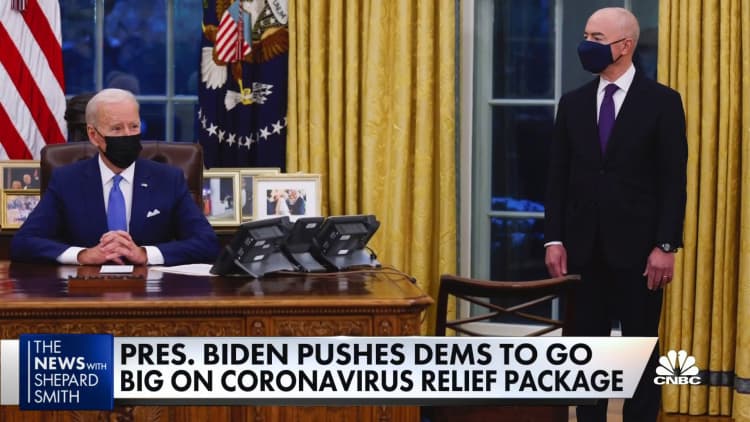President Joe Biden's coronavirus rescue plan, and two of its key economic provisions, have broad support as Democrats try to push it through Congress, a poll released Wednesday found.
More than two-thirds, or 68%, of Americans support the $1.9 trillion package, the Quinnipiac University survey showed. Only 24% of respondents oppose the measure.
The $1,400 direct payments in the plan, a key sticking point as lawmakers negotiate legislation, are more popular than the overall proposal. The poll found 78% of Americans support the stimulus checks, and 18% oppose them.
Respondents also favor Biden's call for a $15 per hour federal minimum wage by a 61% to 36% margin, according to the survey. However, Democrats may not be able to include the provision in their bill in order to comply with budget reconciliation, which will allow them to pass legislation without Republican support.
The poll and others showing broad support for Biden's plan among Americans come as Democrats appear unlikely to win any Republican votes for the package. A group of the GOP's most centrist senators, wary of spending after Congress approved a $900 billion aid bill in December, offered Biden a $618 billion plan.

Biden and Democratic leaders have said the Republican proposal does not go far enough to address the crisis. Democrats have started the process of approving a bill on their own, as the House on Wednesday passed the budget resolution that starts the reconciliation process.
Despite signs of GOP skepticism, Biden believes he can win support across the aisle.
"I think we'll get some Republicans," he told reporters Wednesday ahead of a meeting with Senate Democratic committee chairs who will draft the bill.
The Quinnipiac poll followed a Yahoo News/YouGov survey that found support for key policies contained in Biden's plan. It showed broad backing for provisions such as the direct payments, vaccine distribution funding and the $15 per hour minimum wage.
The size and scope of the direct payments have proven to be the most contentious part of Biden's plan within his own party. Sen. Joe Manchin, a West Virginia Democrat whose opposition alone would sink the bill in the Senate, has said he wants to see the checks more narrowly targeted. As previously proposed, they would start to phase out at $75,000 in income for individuals.
Earlier Wednesday, Biden told House Democrats he would be open to limiting eligibility for the payments but would not cut the amount, CNBC confirmed. The president said he would not break a promise to send the checks, a core pitch he and Sens. Raphael Warnock and Jon Ossoff made during the Georgia runoff elections that sealed Senate control for Democrats.
Among other key pieces, the Biden plan would implement a $400 per week jobless benefit supplement through September, send $350 billion in support to state and local governments, put $20 billion into a national vaccination program, and allocate more rent and mortgage relief funds.
The Quinnipiac poll, taken from Thursday to Monday, surveyed 1,075 adults and has a margin of error of plus or minus 3 percentage points.


